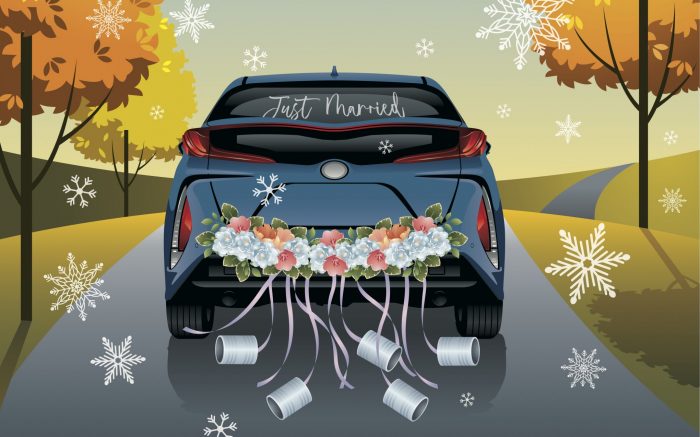D. None of the Above: Wedding season — a time to pack judgments, comparisons and gripes
By Daniel Dunaief

Weddings are such wonderful, optimistic events, where people sometimes throw huge parties, while sharing the wonder of finding each other and committing to a lifetime partnership.
What if, amid all the planning for the big and small elements of a wedding — the original vows, the carefully selected flowers and walk up music, the tailor-made dresses and suits — the guests also thought about all the odd but realistic moments they will likely contribute to this wonderful celebration of the happy couple.
Let’s start with the obvious: really; it shouldn’t be called a wedding. It should be called Judgment Day. This is where guests, some of whom aren’t sure why they were invited or why they came, share their judgements about everything. People might rehearse a few lines or stare at themselves in the mirror, with skeptical faces, as they say:
“Really? The groomsmen wore black suits? Is this a wedding or a funeral?”
“What kind of food is this? I can’t tell, it’s tasteless and the portions are so small.”
“Wait, so the neighbor is performing the marital ceremony and he doesn’t know the full name of the bride? Who thought that would be a good idea?”
“Is that her extended family over there? They may be better looking than we are, but they are chewing gum. Who chews gum at a wedding?”
“Who thought it would be a good idea to have a wedding in Maine in February. Didn’t they think it would be cold? Who likes the cold?”
Okay, after the judgments, there’s the stories guests share. Older relatives, for example, might share anecdotes about the first poop they cleaned up from a bride or groom, that time they saw the bride or groom making out at a movie theater (“that Sheila sure was great. What ever happened to her? Oh, she’s sitting over there? Hi, Sheila, I always liked you.”) and that time they drove four states away to hear them play an oboe solo and weren’t they wonderful for putting out that effort.
Then, there are the comparisons to the guests’ weddings. Guests could prepare for this by looking through their own photo albums. Someone will explain how much worse they had it back then — “we didn’t have the option of Chilean sea bass: we just got tuna fish sandwiches on Wonder Bread.” — and will share details about how many guests they had, and may name-drop about the famous people the next generation doesn’t revere, but who took time out of their lives to attend their wedding.
These brushed off comparison discussions also may include references to things like “table photos” and “table cameras.” People don’t generally have table cameras anymore because almost everyone has a camera on their phone. The happy couple may ask people to share pictures from the event with them.
In addition to all the warm hugs and kisses the bride and groom receive, some relatives may continue the slightly amusing but mostly unwelcome cheek-pinching. That one probably isn’t as prevalent, but the ones who pinched cheeks back in the day must have been working out their fingers for weeks before big events, preparing to burst facial capillaries to connect/ inflict pain on the recipient.
And then some of the revelers may feel the urge to share every detail about the last day or so before this wonderful event, which could include a description of airport delays, the turbulence on the flight, the person who kept getting up from the window seat — “if they knew they needed to use the bathroom on a four hour flight every 37 minutes, why didn’t they get an aisle seat?” — and the lost luggage — “you think I wanted to wear this to your wedding?”
Finally, there are the inevitable “what’s next” questions, which often involves demanding an exact timing and head count for children, the names of future progeny (“you do plan to name at least one of your children after me, right?”), plans for future vacations when the happy couple can come and visit guests who absolutely insist they fly to their home town where they’ll “really show them a great time,” and, on a much smaller scale, what everyone is supposed to do for breakfast the next morning.







